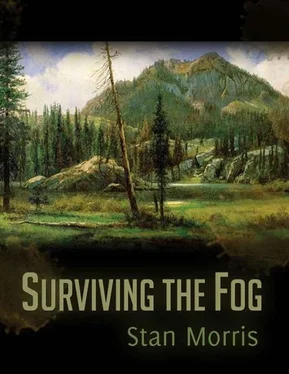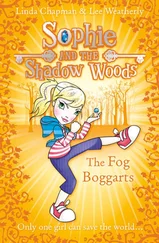They had a large meal for Thanksgiving, with ham, venison, fresh bread and real butter, spinach and potatoes, and tasty cold whole milk. In the morning, Mary opened a package of DVD’s that contained an entire comedy series she and Davis had neglected to watch, and throughout the day members of the household stopped to watch the silly antics of the actors. It was a fun filled day, and Mary was thankful that the kids from the camp seemed happy and were thriving under her care. But that night, she thought of her missing husband, and she cried for a long time.
A few days later, Mary was in the kitchen preparing dinner when Kylie rushed in the door almost in tears.
“Come quick, Mrs. Brown,” she begged. “Ralph is beating up Nathan.”
Mary flew out of the house and ran to the barn. When she arrived, she saw that Ralph had Nathan in a headlock. The two boys struggled as Ralph tried to fend off Kevin, who was circling them and kicking Ralph at every opportunity.
“Stop it! Stop it right now,” she cried. The boys sprang apart. They were panting heavily.
Mary had been toiling hard all day and she was tired. “What is it this time?” she asked wearily.
“He started hitting me for no reason,” Nathan shouted angrily, but Ralph was silent.
“Ralph told him to feed the horses, and Nathan said ‘F you,’” said Paige.
Mary was too tired to referee. “Ralph, you stay here. The rest of you go to the house.” She waited until the kids left, and then she said to Ralph, “I’ll bring you your dinner in a little while.”
“Don’t bother,” replied Ralph sullenly.
Mary felt a rush of heat to her head. “Don’t tell me what to do,” she yelled. “This is my place, not yours.” She stalked out of the barn.
The mood at dinner was subdued. The boys avoided Mary’s eyes. She suspected that they were feeling guilty. In a whiny voice, Comet asked several times where Ralph was, and when he was coming in to dinner.
After dinner, Mary, in a voice that brooked no nonsense, told the kids to clean up, wash the dishes, dry them, and put them away. No one argued with her, or suggested that it was not their turn. Mary made a plate of food for Ralph, and then she clomped to the barn through a light layer of snow.
Ralph was mucking out the stalls. He looked up when she came in, his eyes brightening for one instant, and then he ducked his head and went back to his task. Mary sat down on a low wooden bench.
“Please, come and eat,” she said.
Ralph hesitated. He wanted to say that he was not hungry, but the truth was that he had been working all day, and he was starving. He put down the square shovel sat down on the bench next to Mary. Mary handed him his plate and a moist towel. Ralph wiped his hands and brow, and then he picked up his fork and began to eat. Mary said nothing while he ate. He didn’t speak as he wolfed down his meal, for as usual the food was delicious. At last, sated, he put his plate down, sighed appreciatively, and wiped his face.
“I want to talk to you,” Mary began.
“I know. I screwed up again,” Ralph said with a grunt.
“I want to talk about that, too, but first I want to thank you.”
“What?” Ralph asked.
“I said, I want to thank you. And maybe that’s part of the problem. I haven’t thanked you enough, and so I haven’t been a good example,” she said.
“You don’t need to thank me for anything. I’m staying alive because of you,” Ralph replied.
“We are staying alive together, Ralph. Gee, we sound like the Beegees.”
“Who?” he asked, his brow wrinkling.
“Never mind,” she said. “Ralph, even if I was doing everything, I would still need to thank you now and then. For talking to me, if nothing else. I need adult conversation, now and then. The other kids are a little too close in maturity to my own children.”
“Sorry, I don’t get it.”
“Why did you say, ‘sorry’?” she asked.
“What?”
“Just now, you could have said, ‘I don’t get it’, but instead you said, ‘sorry, I don’t get it,’” she said pointedly.
“Uh…I guess I was apologizing for not understanding,” he answered.
“Yes, you were. You were apologizing. But why?”
“Just trying to be polite.”
“No, you weren’t trying to be polite, you were being polite,” she explained knowing that he could see the difference. “Ralph, that’s most of your problem. You are not polite most of the time, and most of the time you don’t even try to be polite. Hear me out,” she said, as his face clouded over.
“Think about a little ball bearing,” she said. “It rolls around on its track doing its job. But rubbing against metal causes it to heat up. It gets angry. And the metal track gets angry, right back. Something has to be done to calm that anger. So grease is put on that ball bearing. It soothes the friction between the ball bearing and the metal. Bumping up against each other still makes the ball bearing and the metal a little peeved, but that grease cools off both of them. Ralph, politeness is human grease.
“Ralph, you are a decent person. I can say that, because I trust you with my kids. But you don’t practice politeness on a daily basis. I want you to try a few things, please. I want you never to ask anyone in the house to do anything without saying, ‘please.’ And when someone does something that you have asked them to do, I want you to say, ‘thank you.’ If you do that for me consistently, well then, at the end of a month if they don’t start responding better, I’ll, well, I’ll… knock ’em on their butts.”
Ralph laughed that vision. “No you won’t.”
“Well, no I won’t, but I’ll want to,” she answered with her own laugh.
“Say, ‘please’ and ‘thank you,’ huh?” Ralph said. “All right.”
“I have something else I want you to do for me,” she said. “I want you to learn something about each of those kids. Where they come from, who their families are, and what they like. And I want you to tell them things about you, just like you told me about you. Did you know that the twins are going to have a birthday in February? They will be thirteen years old. Talk to them about something other than work and survival. Trust me; it will help you, and it will be good for them.”
Ralph stared down at his hands, and he said, “All right.” Mary got up to leave.
“Mrs. Brown?” she heard him say. She turned. “Thank you for putting up with me.”
She smiled. “You’re welcome, Ralph. And when we are alone, you may call me, Mary.”
During the following month, Ralph made an honest effort to do as Mary had asked. He curbed his sarcasm. He made sure that he said, “please” when he asked someone to do something. On the rare occasion that someone actually responded, he made sure that he said, “thank you.” It wasn’t always easy. Sometimes he forgot. Sometimes he remembered, but his effort was not reciprocated. Sometimes he had to walk away and stew for a while, but gradually things got better between him and the twins.
Asking them about them or speaking about his own life was harder. He was not naturally a loner like Jacob, but he was a more private person than most people. But he made an effort, and slowly his efforts began to pay off.
During this period, the Christmas season arrived. Mary showed the twins a fir tree she wanted, so they chopped it down and carried it back to the house. The girls were busy making natural ornaments. The little kids talked about Santa and elves, and they watched the same Christmas cartoons on the old DVD player over and over until the whole house could quote them.
One night after the kids had gone to bed, and Mary and Ralph were still up, Mary suddenly said, “The angel! I forgot to get the Christmas angel for the top of the tree.”
Читать дальше










